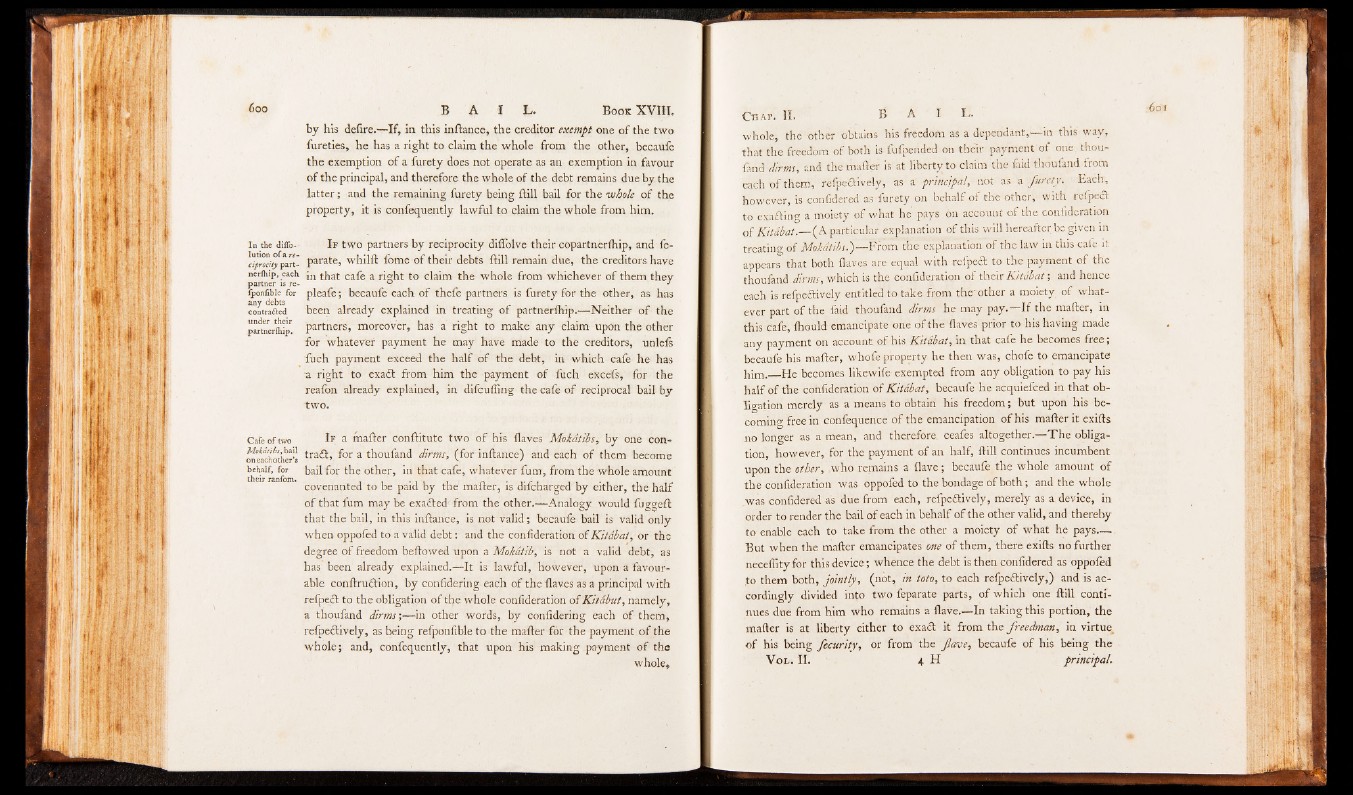
In the diffo-
lution of a reciprocity
partner
Ihip, each
partner is re-
fponfible for
any debts
con trailed
under their
,partner fhip.
Cafe o f two
Mokatibs, bail
on eachother’s
behalf, for
their ranfom.
by his defire.— If, in this inftance, the creditor exempt one of the two
fureties, he has a right to claim the whole from the other, becaufe
the exemption of a furety does not operate as an exemption in favour
o f the principal, and therefore the whole of the debt remains due by the
latter; and the remaining furety being ftill bail for the whole of the
property, it is confequently lawful to claim the whole from him.
I f two partners by reciprocity diflolve their copartnerlhip, and fe-
parate, whilft fome of their debts ftill remain due, the creditors have
in that cafe a right to claim the whole from whichever of them they
pleafe; becaufe each of thefe partners is furety for the other, as has
been already explained in treating of partnerfhip.— Neither of the
partners, moreover, has a right to make any claim upon the other
for whatever payment he may have made to the creditors, unleft
fuch payment exceed the half of the debt, in which cafe he has
a right to exadt from him the payment of fuch excefs, for the
reafon already explained, in difcuffing the cafe of reciprocal bail by
two.
If a mafter conftitute two of his flaves Mokatibs, by one con-
trad, for a thoufand dirms, (for inftance) and each of them become
bail for the other, in that cafe, whatever fum, from the whole amount
covenanted to be paid by the mafter, is difcharged by either, the half
of that fum may be exadted from the other.— Analogy would fuggeft
that the bail, in this inftance, is not valid; becaufe bail is valid only
when oppofed to a valid debt; and the confederation of Kitdbat, or the
degree of freedom bellowed upon a Mokdtib, is not a valid debt, as
has been already explained.— It is lawful, however, upon a favourable
conftrudtion, by confidering each of the Haves a3 a principal with
refpedt to the obligation of the whole confederation of Kitabut, namely,
a thoufand dirms;— in other words, by confidering each of them,
refpedtively, as being refponfible to the mafter for the payment of the
whole; and, confequently, that upon his making payment of the
whole,
whole, the other obtains his freedom as a dependant,— in this way,
that the freedom of both is fufpended on their payment of one thoufand
dirms, and the mafter is at liberty to claim the faid thoufand from
each of them, refpedtively, as a principal, not as a furety. Each,
however, is confidered as furety on behalf of the other, with leipect
to exadting a moiety of what he pays on account of the confideration
of Kitabat.— (A particular explanation of this will hereafter be given in
treating of Mokatibs.)— From the explanation of the law in this cafe it
appears that both flaves are equal with refpedt to the payment of the
thoufand dirms, which is the confideration of their Kitabat; and hence
each is refpedtively entitled to take from the'other a moiety of whatever
part of the faid thoufand dirms he may pay.—I f the mafter, in
this Cafe, fhould emancipate one of the flaves prior to his having made
any payment on account of his Kitdbat, in that cafe he becomes free;
becaufe his mafter, whofe property he then was, chofe to emancipate
him._He becomes likewife exempted from any obligation to pay his
half of the confideration of Kitdbat, becaufe he acquiefced in that obligation
merely as a means to obtain his freedom; but upon his becoming
free in confequence of the emancipation of his mafter it exifta
no longer as a mean, and therefore, ceafes altogether.— The obligation,
however, for the payment of an half, ftill continues incumbent
upon the other, ,who remains a Have; becaufe the whole amount of
the confideration was oppofed to the bondage of both; and the whole
was confidered as due from each, refpedtively, merely as a device, in
order to render the bail of each in behalf of the other valid, and thereby
to enable each to take from the other a moiety of what he pays— ,
But when the mafter emancipates one of them, there exifts no further
neceffity for this device; whence the debt is then confidered as oppofed
to them both, jointly, (not, in toto, to each refpedtively,) and is accordingly
divided into two feparate parts, of which one ftill continues
due from him who remains a (lave— In taking this portion, the
mafter is at liberty either to exadt it from the freedman, in virtue^
of his being fecurity, or from the farce, becaufe of his being the
V ol . II. 4 H principal.